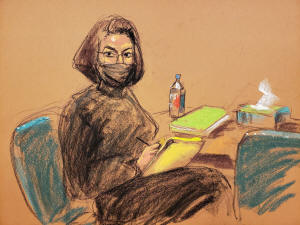Five takeaways from the prosecution's case at Ghislaine Maxwell's sex
abuse trial
 Send a link to a friend
Send a link to a friend
 [December 14, 2021]
By Luc Cohen [December 14, 2021]
By Luc Cohen
(Reuters) - Prosecutors rested their case
in Ghislaine Maxwell's sex abuse trial on Friday after two weeks of
emotional testimony from four women who say Maxwell set them up for
sexual encounters with Jeffrey Epstein when the women were teenagers.
Maxwell, 59, has pleaded not guilty to sex trafficking and other
charges, and her lawyers have said she is being scapegoated for
Epstein's conduct since he is dead.
As Maxwell's lawyers prepare to mount a defense, here are five takeaways
from the prosecution's case:
Accusers' testimony placed Maxwell at the center of the alleged abuse by
Epstein
All four accusers gave emotional testimony. Three of the four said
Maxwell touched their breasts.
A woman identified as Carolyn said Maxwell once touched her at the age
of 14 while she was preparing to massage Epstein.
"I was fully nude and she came in and she felt my boobs and my hips and
my buttocks and said that ... I had a great body for Mr. Epstein and his
friends," Carolyn said.

Jurors also heard from a woman known by the pseudonym Jane, who
testified that Epstein sexually abused her when she was 14. Jane said
Maxwell sometimes participated in their encounters, which often began as
massages before escalating.
Prosecutors showed Maxwell and Epstein had a close, intimate
relationship
A former house manager who worked at Epstein's Palm Beach, Florida,
estate from 1991 to 2002 testified that Maxwell was "lady of the house"
and was with Epstein "95% of the time."
Prosecutors later showed jurors more than a dozen photographs to
demonstrate the intimacy of the relationship between Maxwell and Epstein
in the 1990s. Two of them showed Maxwell rubbing Epstein's bare foot
while it pressed against her chest.
Accusers said Epstein and Maxwell promised they would help them
financially
Three of the four accusers said they were told as teenagers that Epstein
and Maxwell could help them financially. Jane, a singer, said her family
was struggling after her father's death. She said Epstein and Maxwell
told her when she was 14 that they were benefactors of her summer camp
and awarded many student scholarships.
Another accuser, Annie Farmer, said she believed Epstein would help pay
for her college education.
[to top of second column]
|

Ghislaine Maxwell turns to sketch court sketch artist Jane Rosenberg
during the trial of Maxwell, the Jeffrey Epstein associate accused
of sex trafficking, in a courtroom sketch in New York City, U.S.,
December 7, 2021. REUTERS/Jane Rosenberg TPX IMAGES OF THE DAY/File
Photo

The accusers often grew agitated under cross-examination
Maxwell's lawyers aggressively questioned the four women in an
effort to undercut their testimony, questioning the accuracy of
their memories and arguing they were motivated by money.
During cross-examination of Carolyn, an attorney for Maxwell pressed
her about $3.25 million she received from a compensation fund set up
for Epstein victims and whether she had an incentive to "stick to
her story."
"Why is that being mentioned more than once?" asked Carolyn. She
later sobbed on the stand.
The prosecution lost some battles to the defense.
In a victory for Maxwell's defense team, U.S. District Judge Alison
Nathan ruled that two of the accusers - Farmer and Kate - were old
enough to consent during their alleged encounters with Epstein and
that their contact with him could not be considered "illegal," as
prosecutors had alleged in the indictment.
Prosecutors, however, did not have to drop any charges against
Maxwell as a result since neither Farmer nor Kate was the sole
alleged victim underlying any of the six counts she faces.

Nathan also criticized prosecutors after they revealed Jane had
called her brother after her testimony. Prosecutors had expected to
call Jane's brother as a witness to corroborate her account.
Prosecutors withdrew their plans to call Jane's brother after Nathan
told them that "best practice" would dictate they should have
clearly told Jane not to discuss her testimony with other potential
witnesses.
(Reporting by Luc Cohen; Editing by Noeleen Walder and Peter Cooney)
[© 2021 Thomson Reuters. All rights
reserved.] Copyright 2021 Reuters. All rights reserved. This material may not be published,
broadcast, rewritten or redistributed.
Thompson Reuters is solely responsible for this content. |